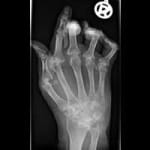
While most consider pharmacogenomics (PGx) the study of response to drugs in the clinic (e.g., efficacy and toxicity), PGx is also an amazing tool to understand fundamental biology of human disease. Drugs perturb human physiology in a way that cannot be accomplished in the resting state.
Most would agree that complex traits such as rheumatoid arthritis (RA) are more than just one disease. In fact, some advocate using the term “syndrome” rather than “disease” for RA, as syndrome emphasizes the complex and heterogeneous etiology. However, what are the underlying subsets?
Genomic technology promises to deconstruct complex traits such as RA. The problem that I have seen, however, is how to classify the subsets of disease. On one hand, we could take an unsupervised approach, and allow the data to form phenotypic subclassifications. In the study of RA synovial tissue (the primary site of pathology), data suggest that there are histological categories of disease depending upon the predominant cell type. One the other hand, what is ultimately important is how to translate disease subsets into clinical care. And for this to occur, there must be a correlation with clinical findings.
Here is where drug exposure can help translate an unsupervised approach into a clinically actionable discovery.…
Read full article...

I prepared a lecture for immunology graduate students at Harvard Medical School on clinical features of rheumatoid arthritis (RA) for the G1 IMM302qc class.
The slide deck can be found here.
A brief summary:
•Clinical characteristics and pathophysiology
•Differential diagnosis
•Exam and laboratory studies
•Treatment strategy
•Research opportunities
The future research opportunities include using human genetics as an anchor for drug discovery in RA. I briefly go over three strategies:
(1) “look-up” method – simple and suggestive but undisciplined (examples in RA: IL6R/tocilizumab, CTLA4/abatacept)
(2) “Allelic series” method – powerful but likely infrequent (example in other disease: PCSK9)
(3) “pathway” method – powerful and comprehensive but target ID difficult (example in RA: CD40 signaling; Gang Li et al, in press PLoS Genetics)
… Read full article...

This blog post pertains to the Systems Immunology graduate course at Harvard Medical School (Immunology 306qc; see here), which is led by Drs. Christophe Benoist, Nick Haining and Nir Hacohen. My lecture is on the role of human genetics as a tool for understanding the human immune system in health and disease. What follows is an informal description of my lecture. The slide deck for the lecture can be downloaded here. Throughout, I have added key references, with links to the manuscripts and other web-based resources embedded within the blog (and also listed at the end). I highlight five key manuscripts (#1, #2, #3, #4, and #5), which should be reviewed prior to the lecture; the other references, while interesting, are optional.
Overview
It is increasingly clear that humans serve as the best model organism for understanding human health and disease. One reason for this paradigm shift is the lack of fidelity of most animal models to human disease. For systems immunology, the mouse is a powerful model organism to understand fundamental mechanisms of the immune system. However, studies in humans are required to understand how these mechanisms can be translated into new biomarkers and drugs.…
Read full article...




